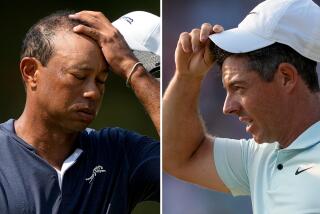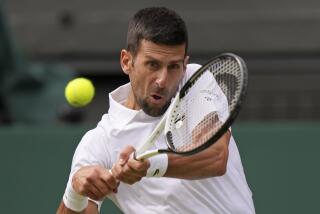McEnroe, Fleming Are Out Before They Can Even Start
- Share via
NEW YORK — It’s now to the point with John McEnroe that even in his absence there is controversy.
The strange odyssey that has been McEnroe’s comeback took another bizarre turn Friday at the U.S. Open when he and doubles partner Peter Fleming arrived late for their first-round match and were defaulted.
Fleming and McEnroe were scheduled to play the third match on the Grandstand court. Since the length of matches here cannot be precisely predicted, most players arrive at the National Tennis Center at Flushing Meadow in what they judge to be enough time to prepare for their match. This usually means they arrive while the match that precedes theirs is in progress.
In the case of McEnroe and Fleming, the two matches preceding theirs went unusually fast. And the traffic on the way to the courts was unusually slow.
“Peter Fleming said they got stuck in traffic,” said Gayle Bradshaw, tournament referee.
Bradshaw said Grand Prix rules allow a 15-minute grace period for players who are late. “The match was called for 2 p.m. sharp,” Bradshaw said. “My assistant referee that I have stationed in the player operations . . . I had called him and said, ‘OK, start the clock now.’
“Before you start a clock, we’ve got a set procedure that we will announce the players over the microphone up there. If we don’t get an immediate response, we check in the downstairs players’ lounge, we check in the upstairs players’ locker room. And after all that has been checked, we start the clock.”
Bradshaw said officials had made such an effort to find McEnroe and Fleming. “We checked the lower locker rooms, the upper locker rooms, even before the (Guy) Forget match was completed,” he said. “We also had our field referees checking the practice courts.”
Bradshaw said Fleming had called to the referees’ office to check on the progress of the Forget match. “At the time, they were told it was 3-2 in the second set, and that was the last we heard of them,” Bradshaw said.
According to the rules, players have 15 minutes in which to appear for a match after it has been called. After 10 minutes, there is a $250 fine. After 15 minutes, there is an additional $750 fine and the match is defaulted.
Bradshaw said that besides the normal 15 minutes, Fleming and McEnroe had an additional 10 minutes earlier, while officials were preparing the court before the match.
Fleming and McEnroe arrived six minutes after the end of the grace period, or at 2:21 p.m.
Bradshaw would not comment on what McEnroe and Fleming had said when they arrived at the court. According to Ken Farrar, chief of supervisors for the Men’s International Professional Tennis Council, however, McEnroe was not happy.
“Mr. McEnroe is much more upset than Mr. Fleming,” Farrar said. “They’re both very upset. Mr. McEnroe is very disappointed about not playing, and very upset about it.
“He couldn’t understand why we couldn’t have waited longer. He never really asked us to reconsider. He just kept saying, ‘How could you do this? Why couldn’t you have waited longer?’ ”
Farrar said there are some exceptions to the rule. If the player is able to contact tournament officials and notify them of the reason why he is late, they may stop the clock.
Knowing when a particular match will start can be tricky business. In Thursday’s rain-delayed morning session, players were stacking up in the players’ lounge, since they were unsure when play would begin. Martina Navratilova brought a pillow so she could sleep before her singles match. She said she always keeps a careful eye on the match before hers.
“You need to know because I need to gauge how much I should eat when,” Navratilova said. “I ended up munching a little more, a little more spaghetti. About 3-2 in the final set, I started getting hungry again. At 4-2, I’m rushing to get ready, and then the next thing I know (Aaron) Krickstein is winning the fourth set.
“You don’t know if it’s going to be another half hour, 45 minutes. It’s hard to follow the men. You could play in an hour and a half, you could play in four hours. But you have to be ready in an hour and a half just in case the match goes real fast.”
Farrar told of a player who was leaving his hotel on the way to his match when he was caught in an elevator between floors. He used the elevator’s phone to call the hotel switchboard, and the hotel operator called tournament officials. They waited for him.
Farrar said that getting stuck in traffic on the Long Island Expressway is not an acceptable excuse for being late.
“I want to emphasize very strongly that it is the player’s responsibility to be at the site when the match is called, and if he anticipates heavy traffic, or bad weather, or whatever, it is still his responsibility to get here. The point is, the rules have to be applied, and no player can be bigger than the game.”
Open Notes Stefan Edberg defeated Kevin Curren, 7-6, 3-6, 4-6, 6-3, 6-2, but the applause for Edberg might have had more to do with what Curren said here last year. Referring to the noise and generally chaotic conditions here, he said: “They should just drop an A-bomb on the place.” Curren, however, said he had been well received this year, no thanks to the media. “I think a lot of people distorted the situation terribly last year,” he said. “And I think the people, the fans, understood and realized eventually that it was a joke. And last year they hassled me a bit because of the way it was presented, which was terrible. But I think the people understand. And they see that I’m out there playing tennis the best I can. And the conditions are not the greatest to play under.”
Tom Gullikson, 34, defeated 10th-seeded Andres Gomez, 3-6, 6-7, 7-6, 6-3, 6-4, in a tight and emotional match. Gullikson was fined for racket abuse and said afterward that he “played with more emotion.” . . . Jimmy Connors, hardly a fan of John McEnroe, was asked his opinion of McEnroe’s default. “The traffic has been awful all day,” he said. “It took me 45 minutes from Shea Stadium (half a mile away) to get to the grounds here. You have to give a little extra grace somewhere along the line. I don’t know all the circumstances. I’m not the referee.” Then, thinking of what he had just said, he added: “Now it’s going to come out in the paper that Connors is on McEnroe’s side.” . . . McEnroe-Fleming was the second doubles default Friday. Earlier, Ken Flach and Robert Seguso had withdrawn because Seguso has torn ligaments in his left knee.
More to Read
Go beyond the scoreboard
Get the latest on L.A.'s teams in the daily Sports Report newsletter.
You may occasionally receive promotional content from the Los Angeles Times.











